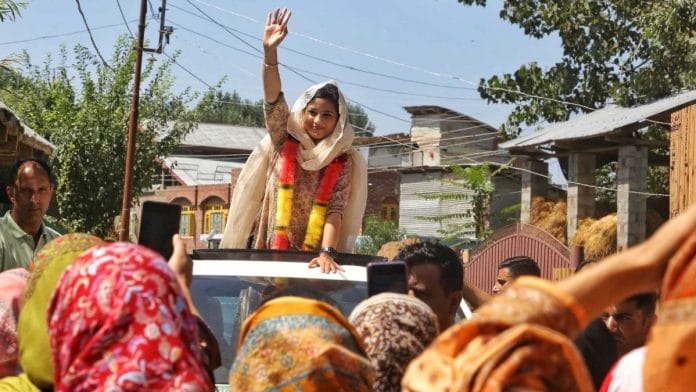New Delhi: Jammu and Kashmir Peoples Democratic Party (PDP) leader Iltija Mufti has been defeated by National Conference (NC) veteran Bashir Veeri in the Bijbehara assembly constituency by a margin of 9,770 votes.
Iltija had conceded defeat from the family bastion of Srigufwara-Bijbehara—as the constituency is now known—before the counting of votes concluded.
In a post on X (formerly Twitter), she wrote, “I accept the verdict of the people.”
I accept the verdict of the people. The love & affection I received from everyone in Bijbehara will always stay with me. Gratitude to my PDP workers who worked so hard throughout this campaign ?
— Iltija Mufti (@IltijaMufti_) October 8, 2024
Iltija, daughter of former J&K Chief Minister Mehbooba Mufti, made her electoral debut from Bijbehara in the first assembly polls in the region in a decade.
Bijbehara is considered a PDP stronghold as the party has never lost an assembly election there since 1996.
National Conference’s Veeri bagged 33,299 votes in the constituency, where the PDP pulled out all the stops to win, but the NC has steadily gained ground over the years.
The election is a test of the Mufti family’s influence after Mehbooba’s defeat from Anantnag-Rajouri in the Lok Sabha election though the PDP had maintained a lead in the Bijbehara assembly segment by getting 20,792 votes against the NC’s 17,698 votes.
Both Iltija’s mother and grandfather, Mufti Mohammad Sayeed, made their electoral debut from the Bijbehara seat. Sayeed won from this south Kashmir seat in 1962, while Mehbooba won the seat in 1996.
However, Mehbooba decided not to fight the assembly elections, saying she would not contest as long as Jammu and Kashmir remained a Union territory and its special status was not restored.
Jammu and Kashmir voted for a 90-member assembly in three phases from 18 September with the results to be declared on Tuesday.
These are the first assembly elections since Article 370 was abrogated and the region’s “special status” was revoked five years ago. In 2019, the central government revoked Article 370, which had given the region significant autonomy, and split the state into two centrally administered Union territories—Jammu & Kashmir and Ladakh.
In its manifesto, the PDP had promised to pursue the restoration of articles 370 and 35A, which granted special rights to permanent residents of Jammu & Kashmir.
The PDP was founded as a mainstream political party in 1999 and over the years rose to become a significant player in Kashmir, but its fortunes have dwindled in recent years.
Despite being part of the INDIA bloc, the PDP contested the assembly elections on its own. The Congress party contested the polls in alliance with the National Conference.
Before contesting the assembly elections, Iltija was appointed media adviser to her mother last year. She has been in charge of her mother’s social media handles since 2019, when many regional leaders, including Mehbooba, were under arrest.
(Edited by Sugita Katyal)






